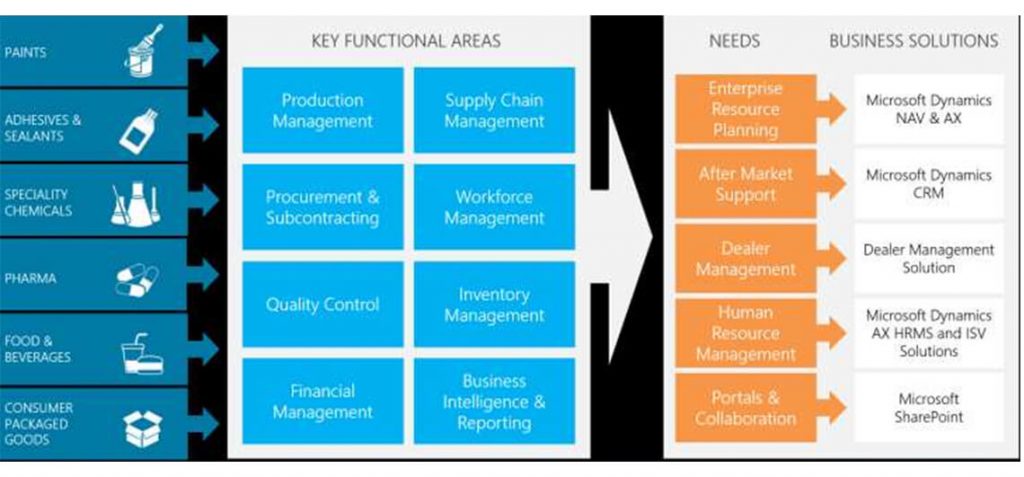The growth in the manufacturing sector lays the platform for the next era of global growth and innovation. The manufacturing sector’s role is changing – the way it contributes to the economy shifts as nations mature. In today’s advanced economies, manufacturing promotes innovation, productivity, and trade. Globally, manufacturing continues to grow, accounting for approximately 16 percent of global GDP. The fast shift in trends of manufacturing processes and the rapid growth of the sector with technological innovations leaves it highly dependent on an efficient IT backbone support to streamline its processes. This is where an effective, efficient and robust ERP system comes into the picture as a sidekick for the manufacturing company to be able to compete globally and sustain in the fast-growing and challenging ecosystem.
The manufacturing sector is primarily categorized into Process Manufacturing and Discrete Manufacturing. Amidst many similarities between these two, the major difference lies in the complexity level of the manufacturing process itself – process manufacturing being more intrinsic with a higher number of stages involved during the manufacturing process. In this article, I am covering the Process Manufacturing industry’s need and thrust on IT-enabling the processes via an ERP solution – tailored to the needs of the business.
The very first step while deciding the implementation of an ERP for a Process manufacturing company would be asking this set of questions to identify the need and the key pain areas to be addressed:
- Are frequent variations in recipes/formula keeping you away from delivering consistent yield?
- Is your current system’s inability to organize warehouse into proper zones a cause for material mismanagement?
- Does the inability to track material shelf life leads to quality variance or wastage or both?
- Are substandard product deliveries to customers a result of poor batch/lot traceability?
- Does inappropriate vendor rating affect the cost, quality and delivery timelines of supplies?
- Does ineffective by-product & co-product management curtail your secondary revenues?

The solution to asked questions lies in implementing an ERP which will resolve the above problems in one go.
Alletec’s Solution For Manufacturing Companies
Alletec Process Manufacturing Solution (ERP for Manufacturing) – robust, scalable and flexible – will help you solve these problems. Built on the world-class Microsoft Dynamics ERP platform, it automates and integrates the core business processes to deliver the highest order of efficiency in production & supply chain functions. Designed especially for the process industry, it effectively helps businesses to overcome functional & decisional problems.
The solution addresses vital functions such as Recipe Management, Yield Ratio Maximization, Quality/Safety Control, Batch Traceability, Bin Management, By-Product & Co-Product Management, and Product Pricing among others in the following verticals of process manufacturing:
- Paints
- Adhesives & Sealants
- Specialty Chemicals
- Pharmaceuticals
- Food & Beverages
- Consumer Packaged Goods
The solution gives total visibility into actionable data for managing businesses, driving profitability by combating downward margin pressures; and improving performance sustainability. It ensures that product development and executions are aligned with customer needs – and compliant with changing regulatory and safety guidelines in the various sectors of the process industry. It keeps businesses fully equipped to deal with raw material management and price volatility. It helps optimize plant safety & performance and synchronizing demand with supply while proactively managing the risk of supply chain disruption.
Process Manufacturing – Solution Architecture

Efficient Rejection Handling & Source Traceability, Quality Control and, By & Co Product Handling are the fundamental needs of a process manufacturing business. Moreover, the surge in global competitive pressure has made rapid order processing, well-managed cash flow, credit control & dealer network; inventory optimization; cost minimization and finite capacity planning imperative for survival.
Businesses, therefore, need to set up a single point of access for all sales related data, manufacturing information, purchase records and quality documentation to help them make better-informed decisions in the benefit of the organization.
Recipe management, Yield Maximization & Waste Minimization is the key to cost control. This necessitates the integration of core business processes at all levels to ensure compliance with definite procedures, quality parameters, and industry regulations.



Comments (0)